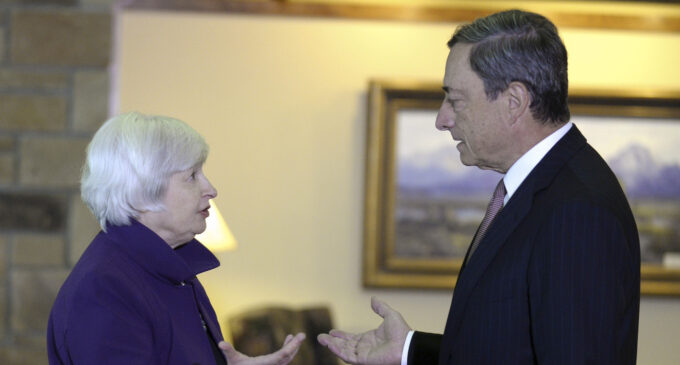Trump vs Yellen and Draghi vs Weidmann

The US dollar has been on a roller-coaster this week. After dropping by more than 1% on Tuesday the dollar index recovered 0.9% from its lows.
The steep drop in the currency came after comments from Donald Trump suggesting that the dollar is too strong, and this led some traders to believe the recent rally could have come to an end, but comments from Fed Chair Janet Yellen on Wednesday brought back hopes to the bulls.
Yellen did not specify the timeline or the pace of projected interest rates hikes, but she indicated the Fed will raise rates few times a year until 2019 and warned of a nasty surprise if the central bank refrained from acting. Although there’s no precise definition of “few”, we can reasonably believe it means two to three times a year, which leave many central banks behind.
Recent economic data supports Yellen’s views as inflation rose in 2016 at its fastest pace in five years. U.S. CPI jumped 0.3% in December to breach the 2% benchmark, and if oil prices held above $50 the trend is not likely to reverse.
This leaves only the Fed’s preferred gauges of inflation, the PCE and Core PCE Price Index below 2%. However, there is a high risk of these indices overshooting the Fed’s target if fiscal policies came into play and the Fed will be left with little options but to fasten the pace of monetary policy tightening, thus keep supporting the dollar.
On the shorter run, Trump will remain the center focus for traders and his inauguration on Friday will play a major role in the dollar’s direction. It’s highly unlikely that he will reiterate that the strong dollar is hurting the economy, but if his speech contains more protectionist policies than stimulus measures, it could harm the dollar, at least in short term.
The European Central Bank is meeting today and will most likely keep monetary policy unchanged after the central bank extended and reduced the monthly bond purchases to €60 from €80 in their last meeting. Although it might be considered a non-event, we’ll be carefully listening to Draghi to see if the recent improvement in Eurozone data, especially when it comes to inflation, will force the ECB to start considering unwinding their QE policies.
PMI’s across the Eurozone reached 5.5 years high in December and inflation climbed to 1.12, the highest since August 2013. Meanwhile German inflation jumped to 1.7%, thanks to higher oil prices. This will undoubtedly create a battle between Bundesbank’s Weidmann and Draghi on when to end the loose monetary policy.
Of course, Mr. Draghi has his reasons, especially since political risks will intensify in the next couple of months with presidential elections in France, Germany and the Netherland’s, but once we’re over it, I believe the ECB will start ending their untraditional QE policies. This suggests the Euro is likely to remain under pressure until probably mid-2017.












There are no comments at the moment, do you want to add one?
Write a comment